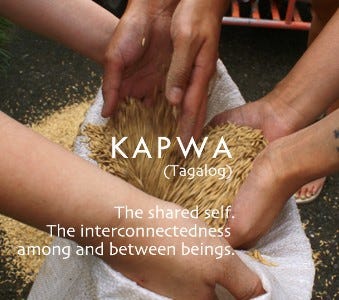Connected by Kapwa
The Oneness of a Team
“You are my other me.
If I do harm to you,
I do harm to myself.
If I love and respect you,
I love and respect myself."
A Lak’ech (Mayan) or Kapwa (Filipino) affirmation
Connected by Kapwa
Chasing Influence: Transformational Coaching to Build Champions for Life
In his book InSideOut Coaching, Joe Ehrmann defines a team as a set of relationships for a cause. Ehrmann explains there are three realities of a great team: a. We belong to each other, b. We need each other, and c. We affect each other. A team brings with it a “oneness.” A single athlete cannot win a team game solo (a great example from comes from Dallas Cowboys running back Emmitt Smith's NFL Hall of Fame speech. In his remarks, Smith overflowed with gratitude and showed how teammates affect each other when speaking about teammate "Moose" Daryl Johnston. Johnston was the fullback who cleared the way for many of Smith's prolific runs. You can view a short clip of Smith’s speech here.
Carolyn Sideco introduced me to a Filipino concept that captures this essence, or oneness, of a team—Kapwa. Kapwa is a Tagalog word that means "shared identity" or "shared humanity.” It's a concept deeply ingrained in Filipino culture, the belief that we are all connected and that our well-being is intertwined. Kapwa is an ethos of sharing where you see and care for others as oneself.
Kapwa is the power of a team; it is the identity created by a group of people who share a set of relationships, culture, and memories. It is about our selfless approach to others and our obligation to treat one another as equal fellow human beings. Kapwa is about more than any amount of money or material possessions. It builds a life that is rich in love, support, and belonging.
“If we have no peace, it is because we have forgotten that we belong to each other.”
— Mother Teresa
Connecting this quote to the story. The words of Mother Teresa emphasize the importance of remembering our interconnectedness and working toward a sense of peace and harmony in our communities. We can do this by recognizing our shared identity and working together for a shared purpose.
Chasing Influence tip: True success is not in individual achievement, but in nurturing the connections and shared purpose that turns a group of individuals into a powerful team.
If you enjoyed this story, a series of three Chasing Influence workbooks is available. Stories are accompanied by discussion questions and answers. Each workbook contains 33 lessons to use with any team.
Updates on Chasing Influence
Chasing Influence: Transformational Coaching to Build Champions for Life is available in Kindle, softcover, hardcover, and audiobook editions.
For additional resources, links to podcast appearances, and other Chasing Influence news, click here.
©Troy Urdahl, 2024
[1] Ehrmann, Joe., Jordan, Gregory. InSideOut Coaching: How Sports Can Transform Lives. United Kingdom: Simon & Schuster, 2011.
[2] For more information on Kapwa, visit www.tandfonline.com/doi/abs/10.1080/09552367.2015.1043173?journalCode=casp20&.


